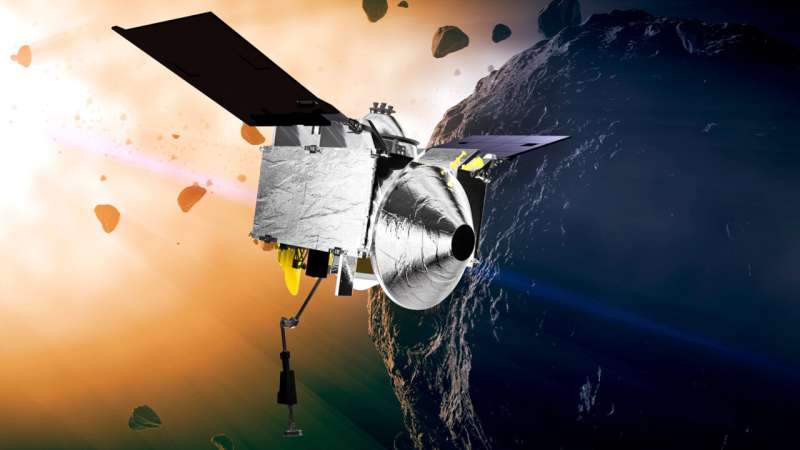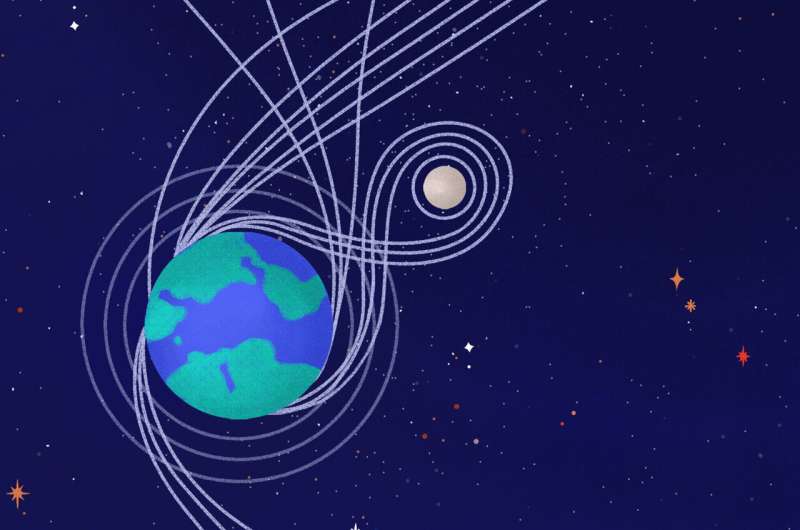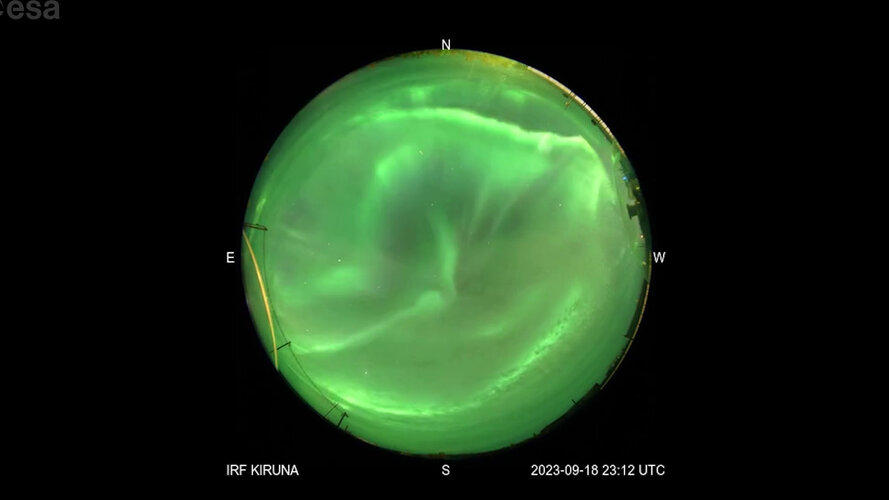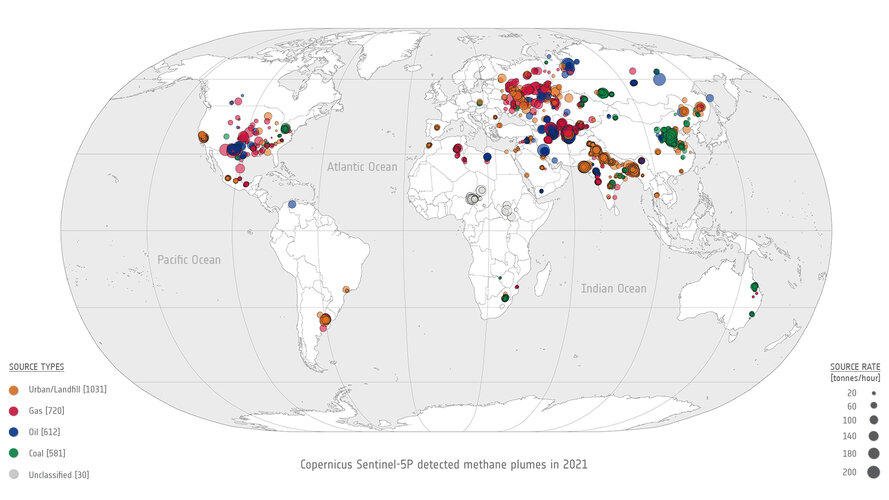
Copernical Team
NASA spacecraft delivering biggest sample yet from an asteroid

Planet Earth is about to receive a special delivery—the biggest sample yet from an asteroid.
Juice: Why's it taking so long?

At their closest point in orbit, Earth and Jupiter are separated by almost 600 million kilometers. At the time of writing, five months after launch, Juice has already traveled 370 million kilometers, yet in time it's only 5% of the way there. Why is it taking so long?
The answer depends on a variety of factors that flight dynamics experts at ESA's Mission Control know well, from the amount fuel used to the power of the rocket, mass of a spacecraft and geometry of the planets.
Firefoxes and whale spouts light up Earth's shield
 Video:
00:00:56
Video:
00:00:56
Did you know, the Northern lights or Aurora Borealis are created when the mythical Finnish ‘Firefox’ runs so quickly across the snow that its tail causes sparks to fly into the night sky? At least, that’s one of the stories that has been told in Finland about this beautiful phenomenon. Another that we love comes from the Sámi people of Finnish Lapland (among others), who describe them as plumes of water ejected by whales.
What do they look like, to you?
Today’s scientific explanation for the origin of the Aurora wasn’t thought up until the 20th Century, by the
POWER Program selects teams to design power beaming relays
 DARPA is entering the first phase of the Persistent Optical Wireless Energy Relay (POWER) program, aimed at revolutionizing energy distribution through airborne wireless power transfer. Three teams - led by RTX Corporation, Draper, and BEAM Co. - will design and develop wireless optical power relays. The program goals include demonstrating the key components necessary for a resilient, speed-of-l
DARPA is entering the first phase of the Persistent Optical Wireless Energy Relay (POWER) program, aimed at revolutionizing energy distribution through airborne wireless power transfer. Three teams - led by RTX Corporation, Draper, and BEAM Co. - will design and develop wireless optical power relays. The program goals include demonstrating the key components necessary for a resilient, speed-of-l NASA-built greenhouse gas detector moves closer to launch
 A state-of-the-art imaging spectrometer, which will measure the greenhouse gases methane and carbon dioxide from space, moved closer to launch this month after being delivered to a clean room at Planet Labs PBC (Planet) in San Francisco.
Designed and built by NASA's Jet Propulsion Laboratory in Southern California, this science instrument will be part of an effort led by the nonprofit Carb
A state-of-the-art imaging spectrometer, which will measure the greenhouse gases methane and carbon dioxide from space, moved closer to launch this month after being delivered to a clean room at Planet Labs PBC (Planet) in San Francisco.
Designed and built by NASA's Jet Propulsion Laboratory in Southern California, this science instrument will be part of an effort led by the nonprofit Carb DARPA seeks tech solutions to create autonomous capabilities for commercial drones
 Commercial drone technology is advancing rapidly, providing cost-effective and robust capabilities for a variety of civil and military missions. As small aerial vehicles play increasingly important military roles on the battlefield, adversaries are developing electromagnetic countermeasures to disrupt communication links between operator and drone, forcing the vehicle to abort mission, return to
Commercial drone technology is advancing rapidly, providing cost-effective and robust capabilities for a variety of civil and military missions. As small aerial vehicles play increasingly important military roles on the battlefield, adversaries are developing electromagnetic countermeasures to disrupt communication links between operator and drone, forcing the vehicle to abort mission, return to China launches Yaogan 39 remote sensing satellite
 China launched a Long March 2D carrier rocket on Sunday afternoon at the Xichang Satellite Launch Center in Sichuan province to place several remote-sensing satellites into orbit, according to China Aerospace Science and Technology Corp.
The State-owned space contractor said in a news release that the rocket blasted off at 12:13 pm and transported the Yaogan 39 satellites into their preset
China launched a Long March 2D carrier rocket on Sunday afternoon at the Xichang Satellite Launch Center in Sichuan province to place several remote-sensing satellites into orbit, according to China Aerospace Science and Technology Corp.
The State-owned space contractor said in a news release that the rocket blasted off at 12:13 pm and transported the Yaogan 39 satellites into their preset SpaceX deploys another 22 Starlink satellites
 Elon Musk's SpaceX launched a Falcon 9 rocket with a payload of 22 Starlink satellites into low-Earth orbit late Tuesday.
The rocket launched at 11:38 p.m. EDT from Space Launch Complex 40 at Cape Canaveral Space Force Station in Florida.
SpaceX had said prior to launch that weather was 90% favorable for liftoff.
The orbitals were deposited into space where they will join
Elon Musk's SpaceX launched a Falcon 9 rocket with a payload of 22 Starlink satellites into low-Earth orbit late Tuesday.
The rocket launched at 11:38 p.m. EDT from Space Launch Complex 40 at Cape Canaveral Space Force Station in Florida.
SpaceX had said prior to launch that weather was 90% favorable for liftoff.
The orbitals were deposited into space where they will join Trio of Sentinel satellites map methane super-emitters

In the quest to address climate change and reduce greenhouse gas emissions, detecting methane leaks – a potent contributor to global warming – has become increasingly vital. Researchers are harnessing the capabilities of cutting-edge satellite technology to monitor these leaks from space.
ESA Open Day in the framework of European Researchers’ Night

ESA will open its doors to members of the public at its Earth Observation centre in Frascati, near Rome, Italy, on 29 September, as part of its annual open day.

